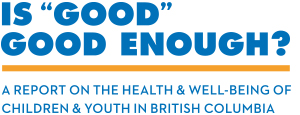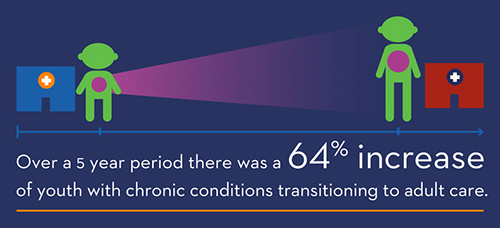JUMP TO: ACTIONS WHERE ARE WE NOW DOCUMENTS & REPORTS
Background/ Why Is This Important?
Thanks to medical advances, youth with special health care needs (including chronic health conditions and/or disabilities) are increasingly living longer lives. This includes transitioning from pediatric to adult health care at around 18 years of age.
The transition process extends beyond transfer of care, and includes planning and preparation to help youth develop independent self-management skills -- learning to navigate a new system of care, developing relationships with new providers, and applying for new benefit programs.
The transition in medical care often overlaps with other milestones in a young person’s life, including changes in education, vocation, housing, and social and familial relationships. This can make transition a vulnerable time for youth.
What Actions Have Already Been Taken?
Family practitioners, pediatric and adult specialists, and allied health professionals can all play a role in providing youth and families with effective support and resources to ensure a successful transition to adulthood.
The resources provided here include guidelines, clinical tools, and important information on how to support the transition from pediatric to adult health services. Please note that this listing is not exhaustive, as there are many groups working to improve youth transition from pediatric to adult care for specific populations.
Resources
1. BC Pediatric Society Transition/Transfer of Patients to Adult Care
- The BC Pediatric Society has created tools and resources to help with transferring patient information when a youth ages out of pediatric care, including a summary transfer form that succinctly captures critical patient information, guidance re: locating a family physician and community resources for transition (by health authority), and transition guidelines for mental health disorders.
2. BC Children’s Hospital: Transition to Adult Care
- Transition preparation to support successful transfer from pediatric to adult care is part of practice for all health professionals at BC Children’s Hospital. Resources (including ON TRAC tools) are available to support the essential partnership with patients, families, and all providers in facilitating transition.
- Health professionals : Access BC Children’s Hospital resources to support your practice
- Youth and families : Find out how to start taking charge of your health and preparing for transition, including checklists, timelines, information and resources
3. Transition Care Management Plans (TCMPs) – condition-specific (cardiology and neurology)
- The TCMPs provide condition-specific information (for neurological and cardiac conditions) to support continuity of care for young adults with chronic health conditions and disabilities, aged 18-25 years in British Columbia, as they age out of pediatric tertiary care and into the adult health care services.
- In addition to condition-specific care management, find information on:
Fee codes
The Special Access Programme (for prescription drugs unavailable in Canada)
Mental health services
Tips for supporting transition
4. UBC Continuing Professional Development (UBC CPD) e-learning module on Transitioning to Adult Care
- Find out why transition matters to your practice by completing: Transitioning to Adult Care for Youth with Chronic Health Conditions and Disabilities (4 separate 15 minute modules)
- FREE and available anytime, anywhere and on any device
- You will be prompted to create an account in order to access this e-learning module–anyone can create a guest account for free.
5. Government of British Columbia: Youth With Special Needs Entering Adulthood
- The BC Government provides information on transition for youth with special needs, including:
Young adults aging out of foster care
Youth with developmental disabilities and their families

